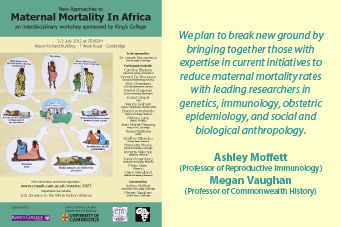Ashley Moffett: New Approaches to Maternal Mortality In Africa
Duration: 4 mins 2 secs
Share this media item:
Embed this media item:
Embed this media item:
About this item

| Description: |
Conference Conveners
Ashley Moffett (Professor of Reproductive Immunology) Megan Vaughan (Professor of Commonwealth History) Conference Summary Millennium Development Goal 5 (MDG5) aims to improve maternal health. Unlike other MDGs, few countries are on track to achieve even the first goal of MDG 5, namely, to reduce maternal mortality by 75%. Sub-Saharan Africa suffers from the highest regional maternal mortality rate (MMR) at 640 maternal deaths per 100,000 live births and the annual decline has only been 0.1%. In stark contrast, average MMR in developed countries is 14. The focus for discussion and action to reduce maternal mortality rates is of necessity largely restricted to the fields of medicine and public health. At the same time, however, there is a spectrum of challenging biological, social and cultural issues that constitute the context within which maternal mortality occurs. In our workshop we plan to break new ground by bringing together those with expertise in current initiatives to reduce MMR with leading researchers in genetics, immunology, obstetric epidemiology, and social and biological anthropology. The aim of the conference is to provide a forum within which people with very different expertise and experience can explore the latest research findings and see how these could influence understanding and ideas for action to reduce maternal mortality in Africa. The following two areas, taken together, will form the focus of the conference: Biological mechanisms determining birth outcomes The social and historical context for maternal mortality in Africa We see this as a unique opportunity to bring together those with experience of implementing initiatives aimed at reducing MMR with researchers from different but highly relevant academic disciplines. Our focus on this important issue will enable us to bring together the latest research in fields that all too often do not ‘talk’ to each other. An additional question to be posed in the course of this conversation concerns the very nature of interdisciplinary enquiry. Do we have a language with which to talk meaningfully of the interactions between biology and history? To what extent can basic scientific research inform policy-making? |
|---|
| Created: | 2012-06-26 10:56 |
|---|---|
| Collection: |
CRASSH
CRASSH trailers |
| Publisher: | University of Cambridge |
| Copyright: | Glenn Jobson |
| Language: | eng (English) |
| Distribution: |
World
|
| Keywords: | Ashley Moffett; CRASSH; |
| Explicit content: | No |
| Aspect Ratio: | 16:9 |
| Screencast: | No |
| Bumper: | UCS Default |
| Trailer: | UCS Default |
| Abstract: | Conference Conveners
Ashley Moffett (Professor of Reproductive Immunology) Megan Vaughan (Professor of Commonwealth History) Conference Summary Millennium Development Goal 5 (MDG5) aims to improve maternal health. Unlike other MDGs, few countries are on track to achieve even the first goal of MDG 5, namely, to reduce maternal mortality by 75%. Sub-Saharan Africa suffers from the highest regional maternal mortality rate (MMR) at 640 maternal deaths per 100,000 live births and the annual decline has only been 0.1%. In stark contrast, average MMR in developed countries is 14. The focus for discussion and action to reduce maternal mortality rates is of necessity largely restricted to the fields of medicine and public health. At the same time, however, there is a spectrum of challenging biological, social and cultural issues that constitute the context within which maternal mortality occurs. In our workshop we plan to break new ground by bringing together those with expertise in current initiatives to reduce MMR with leading researchers in genetics, immunology, obstetric epidemiology, and social and biological anthropology. The aim of the conference is to provide a forum within which people with very different expertise and experience can explore the latest research findings and see how these could influence understanding and ideas for action to reduce maternal mortality in Africa. The following two areas, taken together, will form the focus of the conference: Biological mechanisms determining birth outcomes The social and historical context for maternal mortality in Africa We see this as a unique opportunity to bring together those with experience of implementing initiatives aimed at reducing MMR with researchers from different but highly relevant academic disciplines. Our focus on this important issue will enable us to bring together the latest research in fields that all too often do not ‘talk’ to each other. An additional question to be posed in the course of this conversation concerns the very nature of interdisciplinary enquiry. Do we have a language with which to talk meaningfully of the interactions between biology and history? To what extent can basic scientific research inform policy-making? |
|---|---|
Available Formats
| Format | Quality | Bitrate | Size | |||
|---|---|---|---|---|---|---|
| MPEG-4 Video | 640x360 | 1.84 Mbits/sec | 55.72 MB | View | Download | |
| WebM | 640x360 | 912.97 kbits/sec | 27.08 MB | View | Download | |
| Flash Video | 484x272 | 565.12 kbits/sec | 16.69 MB | View | Download | |
| iPod Video | 480x270 | 504.13 kbits/sec | 14.89 MB | View | Download | |
| MP3 | 44100 Hz | 125.47 kbits/sec | 3.57 MB | Listen | Download | |
| Audio Interchange File Format (AIFF) | 1.35 Mbits/sec | 39.33 MB | Listen | Download | ||
| Advanced Audio Coding (AAC) | 44100 Hz | 123.56 kbits/sec | 3.51 MB | Listen | Download | |
| Auto * | (Allows browser to choose a format it supports) | |||||

